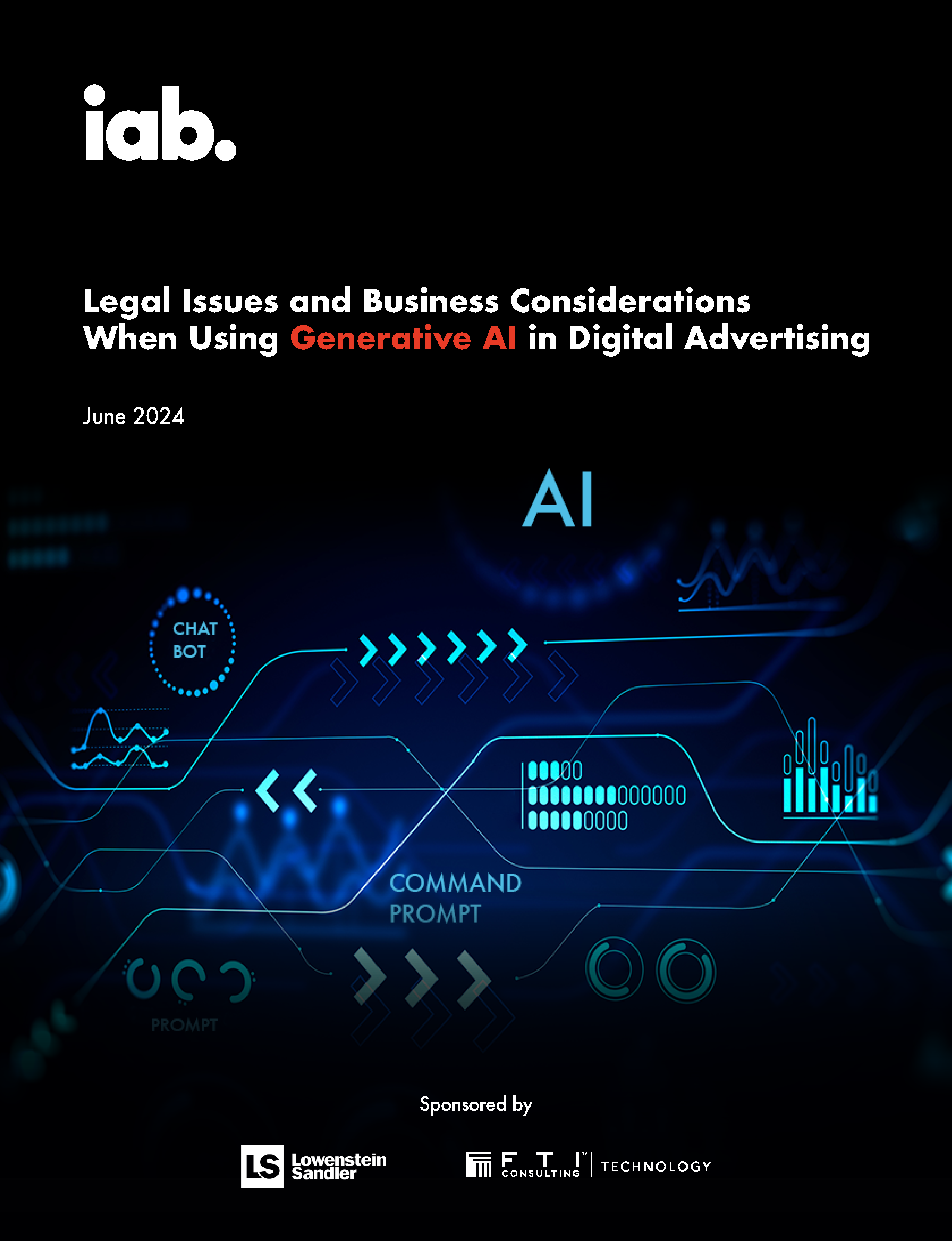Lowenstein Sandler has sponsored and co-authored a whitepaper entitled “Legal Issues and Business Considerations When Using Generative AI in Digital Advertising.” Published by the Interactive Advertising Bureau (IAB), the leading trade body for the digital advertising industry, and co-sponsored by FTI Technology, a global consulting firm, the paper addresses both the legal and business issues arising from the creation, training, and usage of generative AI in digital advertising. The paper provides an overview of key laws—including those relating to intellectual property and privacy—and a summary of proposed laws, which if enacted could materially impact the digital advertising industry.
The whitepaper notes that its publication is “the result of a robust and collaborative conversation between industry experts that took part in IAB’s Generative A.I. working group,” and specifically thanks Lowenstein’s Matthew Savare, Bryan Sterba, and Zachary Bocian “for their thought leadership and tireless drafting.”
Savare, who chairs Lowenstein’s Commercial Contracts practice and is a veteran of high-profile representations in the digital advertising, media, and entertainment sectors, says: “As we note in our conclusion, the AI genie is out of the bottle and there is no going back. Now it is up to the advertisers, agencies, publishers, and other stakeholders in the digital advertising ecosystem to utilize this groundbreaking technology in a responsible, transparent, and compliant manner.”
The paper defines key terms for generative AI, such as weights and biases and large language models (LLMs); it also describes the various uses for AI in the industry of digital advertising.
Several chapters lay out many of the legal and business concerns raised by this technology, including such issues as potential copyright infringement, unfair competition, right of publicity, quality and accuracy risks, bias and ethical challenges, and brand safety and suitability.
The paper also addresses subject of evolving regulation, stating that at “the time of publication, over two dozen jurisdictions have issued AI regulations, with the most comprehensive regulation to date issued by the EU.
Additionally, it notes that “on its face, the EU’s risk-based approach seeks to strike a delicate balance between stringent regulation and fostering technological innovation, though the effects remain to be seen.”
The authors conclude that generative AI has the capacity to revolutionize digital advertising, enabling companies across the entire ad ecosystem—from publishers and SSPs to advertisers and DSPs—to create content, improve operational efficiencies, and optimize campaigns. However, they warn that while there are numerous benefits, there are also risks associated with generative-AI, and advise publishers and advertisers to create, monitor, and enforce acceptable use policies governing their use of artificial intelligence to mitigate risks associated with data privacy compliance and intellectual property infringement, amongst other concerns.
To read the full report, click here.
About Lowenstein Sandler LLP
Lowenstein Sandler LLP is a national law firm with over 350 lawyers based in New York, Palo Alto, New Jersey, Utah, and Washington, D.C. The firm represents leaders in virtually every sector of the global economy, with particular emphasis on investment funds, life sciences, and technology. Recognized for its entrepreneurial spirit and high standard of client service, the firm is committed to the interests of its clients, colleagues, and communities.
About IAB
The Interactive Advertising Bureau empowers the media and marketing industries to thrive in the digital economy. Its membership comprises more than 700 leading media companies, brands, agencies, and the technology firms responsible for selling, delivering, and optimizing digital ad marketing campaigns. The trade group fields critical research on interactive advertising, while also educating brands, agencies, and the wider business community on the importance of digital marketing. In affiliation with the IAB Tech Lab, IAB develops technical standards and solutions. IAB is committed to professional development and elevating the knowledge, skills, expertise, and diversity of the workforce across the industry. Through the work of its public policy office in Washington, D.C., the trade association advocates for its members and promotes the value of the interactive advertising industry to legislators and policymakers. Founded in 1996, IAB is headquartered in New York City.












